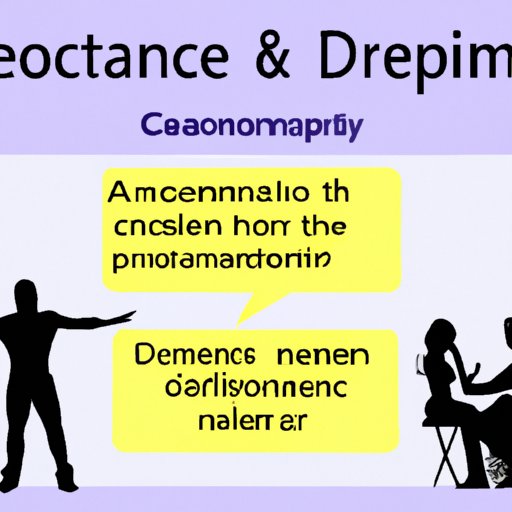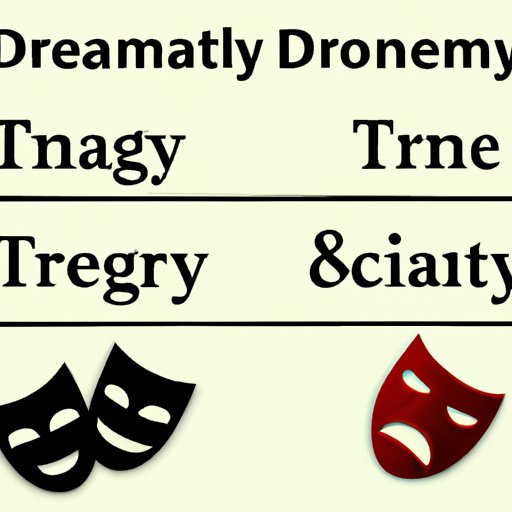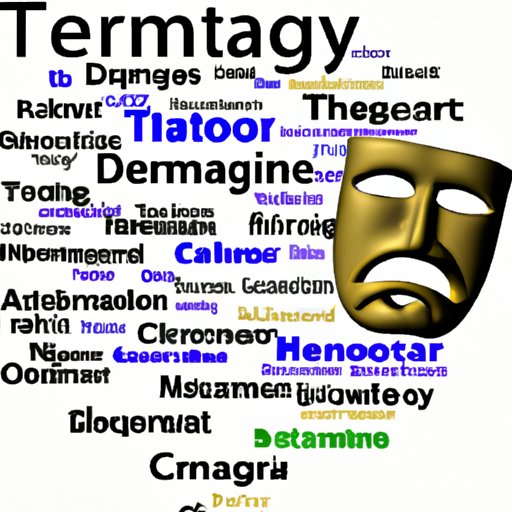Introduction
Drama has been an important form of storytelling since ancient times, providing a way for writers to explore complex themes and ideas through the use of characters and conflict. In literature, drama is defined as a genre of narrative that relies on dialogue and action to move the story forward. It often features a protagonist who faces obstacles and struggles with inner conflicts, and is written to create suspense and evoke emotion in readers.
The purpose of this article is to explore the history of drama in literature, its role in providing insight into human nature, and how authors use characterization and conflict to build suspense. It will also examine the differences between tragedy and comedy, and how these genres are used to create emotional responses. Finally, it will look at how symbolism and metaphor can be used to enhance the meaning of dramatic writing.
An Overview of Drama in Literature: History, Types and Popular Examples
The origins of drama in literature can be traced back to ancient Greece, where plays were written to be performed in front of large audiences. These plays often featured gods and goddesses, and were used to explore the human condition and moral dilemmas. Over time, drama evolved to become more complex, incorporating elements from other genres such as romance, comedy, and tragedy.
Today, there are several different types of drama, including classical, modern, and experimental. Classical drama focuses on serious topics and often features a protagonist who experiences an inner struggle. Modern drama is more focused on realism and typically includes social commentary. Experimental drama uses unconventional techniques to explore new ideas and challenge existing norms.
Some of the most famous examples of dramatic writing include Shakespeare’s plays, such as “Romeo and Juliet” and “Hamlet”; Henrik Ibsen’s “A Doll’s House”; and Arthur Miller’s “Death of a Salesman”. All of these works feature characters who face difficult decisions, and explore themes such as love, betrayal, and morality.
The Role of Drama in Literature: Its Importance and Function
Drama is an important part of literature because it provides insight into human nature and allows us to explore complex topics in an accessible way. Through the use of dialogue and action, writers are able to create characters and storylines that resonate with readers and evoke strong emotions.
One of the main functions of drama is to provide insight into human nature. By examining the thoughts and actions of characters, readers are able to gain a better understanding of their own motivations and behavior. As Nobel Prize-winning author Toni Morrison said, “In fiction I can make my characters do what I want them to do. That way I can examine the human condition and how we behave.”
Another function of drama is to create emotional responses in readers. By exploring difficult topics such as death, loss, and love, writers are able to evoke strong reactions in their audiences. Furthermore, drama can serve as a form of social critique, allowing writers to comment on current issues and spark conversations about important topics.

Characterization and Conflict in Drama: How These Elements Create Suspense
In order to create suspense and draw readers into the story, writers must use characterization and conflict. Characterization involves developing the characters and making them believable by giving them unique personalities, motivations, and flaws. Conflict is necessary in order to create tension and propel the story forward. It can take the form of internal struggles, such as a character’s inner dilemma, or external battles, such as a fight between two opposing forces.
By using characterization and conflict, writers are able to build suspense and keep readers engaged. As novelist E.M. Forster famously said, “The king died and then the queen died is a story. The king died and then the queen died of grief is a plot.” This quote emphasizes the importance of conflict in creating a compelling plot and keeping readers interested.

Tragedy and Comedy in Drama: A Comparison of Their Use in Literature
Tragedy and comedy are two of the most popular genres of drama. Tragedy typically features a protagonist who is faced with insurmountable odds, and whose efforts to overcome his or her challenges ultimately lead to disaster. Comedy, on the other hand, focuses on lighthearted themes and often features humorous characters and situations.
Although these genres are quite different, they both have the ability to evoke strong emotions in readers. Tragedy can inspire feelings of sadness and despair, while comedy can bring joy and laughter. Some of the most famous examples of tragic writing include William Shakespeare’s “Macbeth” and Sophocles’ “Oedipus Rex”, while some of the most celebrated comedies include Moliere’s “The Misanthrope” and Oscar Wilde’s “The Importance of Being Earnest”.

Exploring the Use of Symbolism and Metaphor in Dramatic Writing
Symbolism and metaphor are two literary devices often used in dramatic writing to enhance the meaning and add depth to the story. Symbolism involves using objects or symbols to represent abstract ideas, while metaphor is a comparison between two seemingly unrelated things. Both of these devices can be used to evoke emotion, create suspense, and add layers of meaning to a story.
For example, in the play “Death of a Salesman”, author Arthur Miller uses the symbol of a diamond to represent Willy Loman’s dreams and ambitions. He also uses the metaphor of a staircase to describe the journey of life, and how each step leads to a new experience. By using symbolism and metaphor, Miller is able to add complexity and depth to his writing, and create a powerful and moving story.
Conclusion
In conclusion, drama has been an important part of literature for centuries. It provides insight into human nature and allows writers to explore complex topics in an accessible way. Through the use of characterization, conflict, and symbolism, writers are able to create suspense and evoke emotion in readers. Drama can also serve as a form of social critique, and has been used to comment on current events and spark conversations about important topics.
Tragedy and comedy are two popular genres of drama, and both have the ability to evoke strong emotions in readers. While tragedy can inspire feelings of sadness and despair, comedy can bring joy and laughter. By using symbolism and metaphor, writers are able to enhance the meaning of their stories and add layers of complexity to their work.
Overall, drama is an essential element of literature and provides a powerful way to explore human nature and the complexities of the human experience. It is a genre that continues to evolve and captivate readers around the world.
(Note: Is this article not meeting your expectations? Do you have knowledge or insights to share? Unlock new opportunities and expand your reach by joining our authors team. Click Registration to join us and share your expertise with our readers.)
